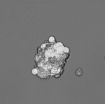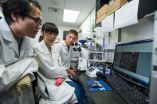Vegetable oil ingredient key to destroying gastric disease bacteria
In mice, therapeutic nanoparticles dampen H. pylori bacteria and inflammation that lead to ulcers and gastric cancer
2014-11-25
(Press-News.org) The bacterium Helicobacter pylori is strongly associated with gastric ulcers and cancer. To combat the infection, researchers at University of California, San Diego School of Medicine and Jacobs School of Engineering developed LipoLLA, a therapeutic nanoparticle that contains linolenic acid, a component in vegetable oils. In mice, LipoLLA was safe and more effective against H. pylori infection than standard antibiotic treatments.
The results are published online Nov. 24 in the Proceedings of the National Academy of Sciences.
"Current H. pylori treatments are facing a major challenge -- antibiotic resistance," said Liangfang Zhang, PhD, professor in the UC San Diego Moores Cancer Center and Department of Nanoengineering. "Our goal was to develop a nanotherapeutic that can tolerate the harsh gastric environment, kill H. pylori and avoid resistance." Zhang and Marygorret Obonyo, PhD, assistant professor in the Moores Cancer Center and Department of Medicine, are co-senior authors of the study.
LipoLLA is a lipid (fat) particle that contains linolenic acid. When LipoLLA encounters H. pylori, it fuses with the bacterial membrane. Then the particle's linolenic acid payload spills out, disrupting the membrane and killing the bacteria.
Zhang, Obonyo and their team labeled LipoLLA particles with fluorescent markers, fed them to mice and watched as the particles distributed themselves in the stomach lining -- and stayed there. After treatment, they measured bacterial load in the stomach and markers of inflammation. Compared to standard antibiotic therapies, LipoLLA was more effective at getting rid of H. pylori. What's more, LipoLLA was not toxic to the mice and the bacteria did not develop resistance to the therapy.
"This is the first step to verify that we can make this therapeutic nanoparticle and demonstrate that it works to reduce H. pylori colonization. We're now working to further enhance the particle, making it more stable and more effective," Zhang said.
INFORMATION:
Co-authors include Soracha Thamphiwatana, and Weiwei Gao, UC San Diego.
This research was funded by the National Institute of Diabetes and Digestive and Kidney Diseases (grant R01DK095168), part of the National Institutes of Health.
[Attachments] See images for this press release:

ELSE PRESS RELEASES FROM THIS DATE:
2014-11-25
Medford/Somerville, Mass--Researchers in human genetics have known that long nucleotide repeats in DNA lead to instability of the genome and ultimately to human hereditary diseases such Freidreich's ataxia and Huntington's disease.
Scientists have believed that the lengthening of those repeats occur during DNA replication when cells divide or when the cellular DNA repair machinery gets activated. Recently, however, it became apparent that yet another process called transcription, which is copying the information from DNA into RNA, could also been involved.
A Tufts ...
2014-11-25
Researchers at the University of Leeds have shed light on a gene mutation linked to autistic traits.
The team already knew that some people with autism were deficient in a gene called neurexin-II. To investigate whether the gene was associated with autism symptoms, the Leeds team studied mice with the same defect.
They found behavioural features that were similar to autism symptoms, including a lack of sociability or interest in other mice.
Dr Steven Clapcote, Lecturer in Pharmacology in the University's Faculty of Biological Sciences, who led the study published ...
2014-11-25
Flexible electronics have been touted as the next generation in electronics in various areas, ranging from consumer electronics to bio-integrated medical devices. In spite of their merits, insufficient performance of organic materials arising from inherent material properties and processing limitations in scalability have posed big challenges to developing all-in-one flexible electronics systems in which display, processor, memory, and energy devices are integrated. The high temperature processes, essential for high performance electronic devices, have severely restricted ...
2014-11-25
Cancer stem cells are particularly difficult to eradicate and are at the heart of why it is so hard to more effectively treat cancer patients, as the post-treatment survival of cancer stem cells drives tumour recurrence, the systemic spread of cancer and, ultimately, treatment failure.
The researchers, based at the University's Institute of Cancer Sciences and the Cancer Research UK Manchester Institute - both part of the Manchester Cancer Research Centre - investigated the role of mitochondria which produce and release energy within cells. In this context, the new ...
2014-11-25
CHICAGO (November 25, 2014) - New research shows providing detainees wash cloths treated with a skin cleanser could reduce the prevalence of Staphylococcus aureus (S. aureus) bacteria in U.S. jails. Researchers looked at the effect on transmission of S. aureus of using wash cloths treated with chlorhexidine gluconate (CHG) compared with wash cloths with only plain water in detainees at Dallas County Jail. The study was published in the December issue of Infection Control and Hospital Epidemiology, the journal of the Society for Healthcare Epidemiology of America (SHEA). ...
2014-11-25
CHICAGO (November 25, 2014) - A new study finds a decrease in an emergent strain of methicillin-resistant S. aureus (MRSA) that is resistant to last line defense antibiotics. Researchers examined the prevalence of vancomycin-resistant Staphylococcus aureus (VRSA) infections in southeastern Michigan, where the majority of these infections have occurred in the U.S. The study is published in the December issue of Infection Control and Hospital Epidemiology, the journal of the Society for Healthcare Epidemiology of America (SHEA).
"Vancomycin is one of the few antimicrobial ...
2014-11-25
With research and development costs for many drugs reaching well into the billions, pharmaceutical companies want more than ever to determine whether their drugs already at market have any hidden therapeutic benefits that could warrant putting additional indications on the label and increase production.
Such repurposing of drugs requires evidence of efficacy, and to find candidate drugs for randomized controlled repurposing trials, investigators can use computer simulation and scans of health care billing data, in addition to in vitro and in vivo testing.
A study led ...
2014-11-25
Parasites use Trojan horse subterfuge to suppress the immunity of their victims when causing infection, according to a study.
The finding, which shows a new trick parasites can play, paves the way to possible treatments for infectious diseases and allergies.
Scientists have shown that parasites are able to secrete tiny sealed packages of genetic material into the cells of their victims, in order to suppress the immune response to infection.
The packages, known as vesicles, mimic those that are produced naturally in most organisms to carry out everyday functions such ...
2014-11-25
(Boston)-- In the largest study of the genetics of memory ever undertaken, an international researcher team including scientists from Boston University School of Medicine (BUSM), have discovered two common genetic variants that are believed to be associated with memory performance. The findings, which appear in the journal Biological Psychiatry, are a significant step towards better understanding how memory loss is inherited.
Longer life spans and the increased prevalence of memory impairment and dementia world-wide underscore the critical public health importance of ...
2014-11-25
BUFFALO, N.Y. - A new hybrid vehicle is under development.
Its performance isn't measured by the distance it travels, but rather the delivery of its cargo: vaccines that contain genetically engineered DNA to fight HIV, cancer, influenza and other maladies.
Described recently in the Proceedings of the National Academy of Sciences, the technology is a biomedical advancement that could help unleash the potential of DNA vaccines, which despite two decades of research, have yet to make a significant impact in the treatment of major illnesses.
"The technology that we're developing ...
LAST 30 PRESS RELEASES:
[Press-News.org] Vegetable oil ingredient key to destroying gastric disease bacteria
In mice, therapeutic nanoparticles dampen H. pylori bacteria and inflammation that lead to ulcers and gastric cancer




